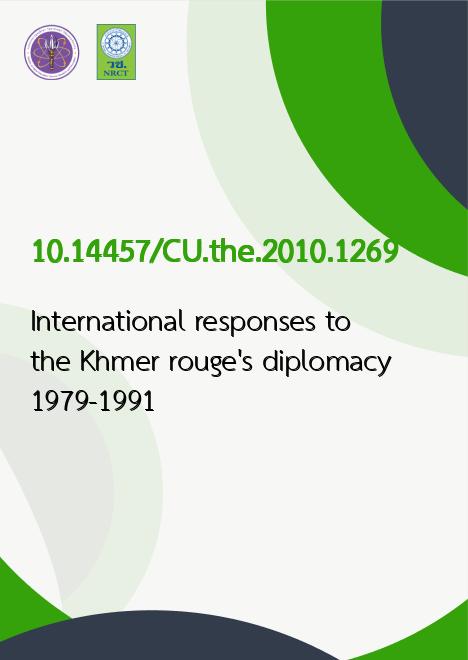
|
International responses to the Khmer rouge's diplomacy 1979-1991 |
|---|---|
| รหัสดีโอไอ | |
| Title | International responses to the Khmer rouge's diplomacy 1979-1991 |
| Creator | Theara Thun |
| Contributor | Theera Nuchpiam |
| Publisher | Chulalongkorn University |
| Publication Year | 2553 |
| Keyword | เขมรแดง -- ความสัมพันธ์กับต่างประเทศ -- 2522-2534, พรรคกัมพูชาประชาธิปไตย -- ความสัมพันธ์กับต่างประเทศ -- 2522-2534, ความสัมพันธ์ระหว่างประเทศ, การทูต, Party of Democratic Kampuchea -- Foreign relations -- 1979-1991, Khmer Rouge -- Foreign relations -- 1979-1991, International relations, Diplomacy |
| Abstract | Following the toppling of its regime by the Vietnamese soldiers in the early of 1979, the Khmer Rouge not only survived the Vietnamese onslaught but was able to organize resistance to the continued presence of Vietnamese troops in Cambodia. Its survival and ability to resist Vietnam for over a decade partly resulted from its foreign policy, and largely due to international support: diplomatic, economic as well as military, particularly from China and the ASEAN countries, and the United States. These countries supported the Khmer Rouge because they shared the same point of view concerning the Cambodian conflict, which was started by the Vietnamese occupation of Cambodia, at roughly the same time as the Soviet Union’s invasion of Afghanistan. In order to put pressure on Vietnam to withdraw its troops, they provided assistance to Pol Pot’s soldiers, who were most active, numerous, and effective fighters compared to the other two resistance military forces along the Cambodian-Thai border. Through Thailand, China supplied the Khmer Rouge with massive material and military aid, while ASEAN used diplomatic effort to maintain the Khmer Rouge’s seat at the United Nations. The United States lined up behind China and ASEAN’s policies by leading the West to vote for the Khmer Rouge’s representative at the UN for all of the 1980s. Additionally, Washington indirectly and directly provided economic and military aid to the Khmer Rouge camps. At the end of the Cambodian conflict, China, ASEAN, and the United States assumed major roles by including the Khmer Rouge into a peace resolution signed in October 1991. |
| URL Website | cuir.car.chula.ac.th |